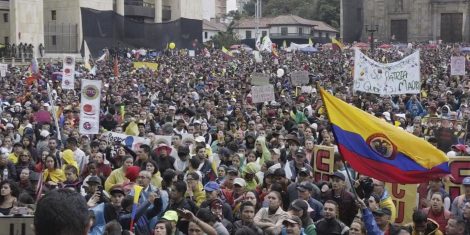Thursday´s national strike in Colombia was one of the largest in the recent history of the country. Protests continued on Friday, in a spontaneous way.
Millions of people took to the streets on Thursday in Colombia against the package of measures implemented by President Iván Duque. While demonstrations in Bogota, the capital city of the country, were massive, social organizations are also highlighting the high numbers of demonstrators who participated in the mobilizations in other regions of Colombia.
The national strike was called, among other issues, against the government proposals for labor and pension reforms and to denounce the 730 social leaders murdered since the signing of the Peace Accords in November 2016 between the Colombian state and the left-wing Revolutionary Armed Forces of Colombia (FARC).
Duque´s neoliberal package of measures, with the involvement of the International Monetary Fund, was the last straw for the people.
Even on Friday night, the protests continued with spontaneous “banging of pots” (“cacerolazos) in different cities, that have “intimidated” the repressive actions of the Police and its Riot Squad (ESMAD). There were denunciations of violent repression, with excessive use of force, in several cities.
On Tuesday, two days before the strike, there were simultaneous raids in several cities of the country against the houses of leaders of the Congress of the Peoples and other social movements. [1] The operatives aimed to discourage protests, as the social movements and organizations interpreted. But they did not succeed.
On Friday, Real World Radio interviewed peasant leader Nury Martínez of FENSUAGRO (the National Agricultural Federation) and Via Campesina Colombia and the coordinator of environmental organization CENSAT Agua Viva – Friends of the Earth Colombia, Diego Cardona.
Nury highlighted the national nature of the mobilization and considered that “the people are tired of repression, especially because now there are proposals against pensioners and for labor and fiscal reforms”. “This is felt by everybody, not just a specific sector of the Colombian society”, she explained.
She added that the protest was “a response against murders, against the four or five murders that take place every single week, with the government remaining in silence or saying that these murders are the result of differences in the communities”. “The main struggle is against transnational corporations that want to take all our natural resources away through the licenses granted by the government. More conflicts take place in the places where most licenses have been granted”, declared the peasant leader. She also explained that “people are being murdered for fighting for their rights, for living on the territories, for producing food for the Colombian people”.
With reference to the peasant demands in the framework of this national strike, the representative of FENSUAGRO and Via Campesina Colombia said that Duque´s administration has not shown political will to implement the Land Fund proposed in the Peace Accords, or to give back over six million hectares. “We are not recognized as political subjects of rights, they don´t recognize that we are in the territories producing food, they treat us as if we didn´t exist”, concluded Nury.
Meanwhile, Diego Cardona highlighted the diversity of actors who participated in the protest, which gathered students, indigenous people, afro-descendant people, peasants, workers, among others. Diego welcomed that the strike “has been one of the largest mobilizations in the recent history of the country”.
The coordinator of CENSAT Agua Viva – Friends of the Earth Colombia made reference to different issues, but we asked specifically about the issues that are important for environmentalism. He said that the most important thing was to “respect life above anything else”. And he joined “the demands for respect to the lives of social and environmental activists in the country”. “We have to bear in mind that approximately 20 per cent of the people murdered were activists defending environmental rights and natural resources”, stressed Diego.
The Colombian environmental activist also questioned that the National Development Plan of the government legalized deforestation of at least 600,000 hectares of land “for land grabbing, cattle farming or the expansion of oil palm monoculture plantations”.
